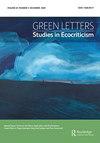关于与CRISPR-Cas相关的生物,我们讲述了哪些故事?基因编辑研究中科学家对多物种关系的思考
Q1 Arts and Humanities
引用次数: 0
摘要
研究异种移植和蚊子基因驱动的科学家声称,由于基因编辑技术CRISPR-Cas,他们在各自的领域取得了突破。当谈到这些应用时,科学家们将它们描述为拯救人类生命的工具。通过对人类健康的关注,被编辑并密切相关的生物仍然模糊不清。为了让这些生物进入对话,我与这两个领域的科学家进行了接触,并为他们提供了一个空间,让他们反思他们对非人类动物的研究实践。通过这一点,科学家们的故事开始偏离人类健康的焦点。他们的叙述随着他们利用更广泛的曲目而发生变化,包括环境问题和情感经历。我的发现建立在女权主义科学研究的基础上,对基因编辑研究中的多物种关系进行了更细致的描述。我主张为研究CRISPR-Cas的研究人员的不同故事提供空间,可以为响应能力提供途径。本文章由计算机程序翻译,如有差异,请以英文原文为准。
What Stories Do We Tell About the Critters Involved with CRISPR-Cas? Examining Scientists’ Reflections on Multispecies Relationships in Gene Editing Research
ABSTRACT Scientists researching xenotransplantation and mosquito-focused gene drives are claiming breakthroughs in their fields due to the gene editing technology CRISPR-Cas. When speaking about these applications, scientists narrate them as tools to save human lives. Through this focus on human health, the critters who are edited and intimately involved remain obscured. To bring these creatures into the conversation, I engage with scientists in both fields and provide a space for them to reflect upon their research practices with non-human animals. Through this, scientists’ stories start to deviate from the focus of human health. Their narrations shift as they draw upon a broader range of repertoires incorporating environmental concerns and experiences of affect. My findings build upon feminist science studies by contributing more nuanced narrations of multispecies relationships in gene editing research. I advocate that cultivating space for diverse stories to emerge from researchers working with CRISPR-Cas can produce avenues for response-ability.
求助全文
通过发布文献求助,成功后即可免费获取论文全文。
去求助
来源期刊

Green Letters
Arts and Humanities-Literature and Literary Theory
CiteScore
0.50
自引率
0.00%
发文量
38
期刊介绍:
Green Letters: Studies in Ecocriticism explores the relationship between literary, artistic and popular culture and the various conceptions of the environment articulated by scientific ecology, philosophy, sociology and literary and cultural theory. We publish academic articles that seek to illuminate divergences and convergences among representations and rhetorics of nature – understood as potentially including wild, rural, urban and virtual spaces – within the context of global environmental crisis.
 求助内容:
求助内容: 应助结果提醒方式:
应助结果提醒方式:


